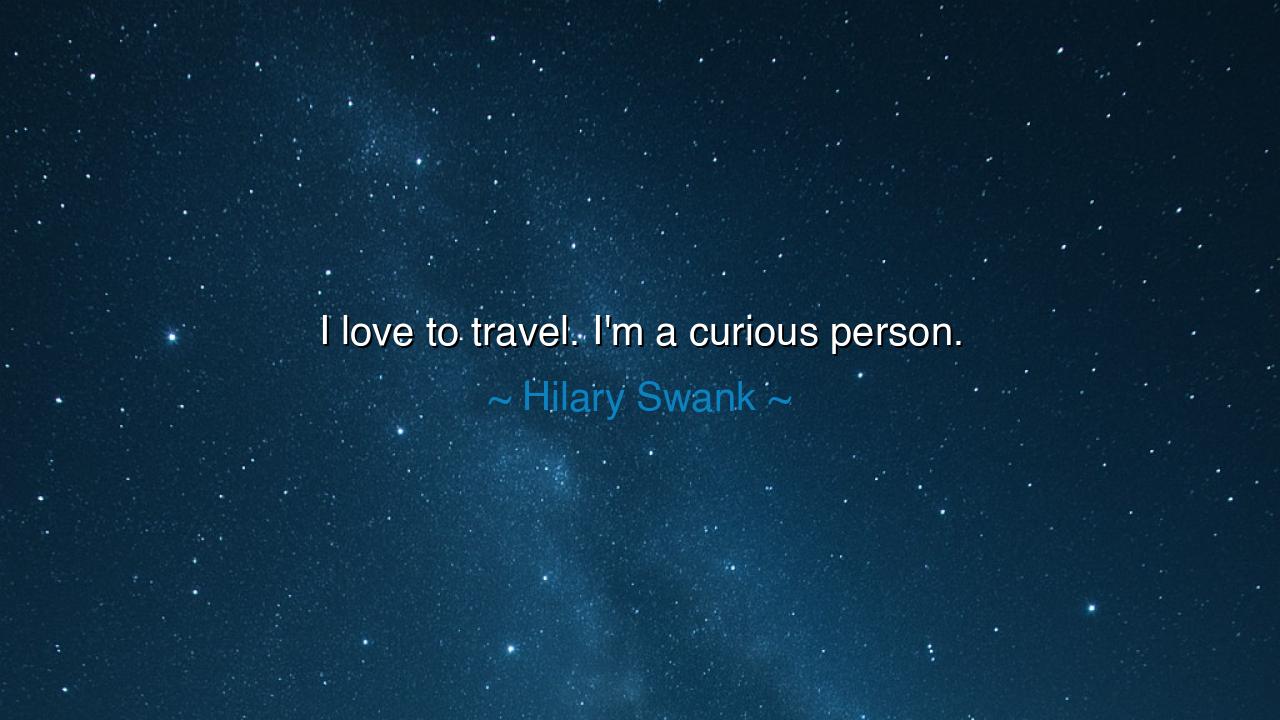
I love to travel. I'm a curious person.






So spoke Hilary Swank, actress and seeker of experience: “I love to travel. I’m a curious person.” Her words are simple, yet they echo with the force of something eternal, for they speak not merely of leisure, but of the human spirit’s hunger to wander, to learn, to see beyond its own horizon. In her confession lies a truth as old as humankind itself: that curiosity is the flame that drives discovery, and travel is the path upon which that flame is fed.
To say “I love to travel” is to declare a love for change, for motion, for the unknown. The one who travels accepts uncertainty as a companion and discomfort as a teacher. And to say “I am a curious person” is to reveal the root of this love—for curiosity is the restless force that compels the soul to leave the safety of the hearth and seek the mysteries of the world. Without curiosity, travel becomes mere movement; with it, travel becomes transformation.
The ancients knew this sacred bond between curiosity and journey. Consider Herodotus, called the Father of History, who roamed far from his homeland to collect the stories of many peoples. It was not wealth or conquest that drove him, but the same spirit Swank invokes—curiosity. And through his travel, he gave us not only accounts of wars and kings, but glimpses into the customs, beliefs, and wonders of the wider world. His curiosity fed his travels, and his travels fed the knowledge of generations.
Or recall Ibn Battuta, the great Moroccan traveler, who set forth at the age of twenty-one and journeyed across Africa, the Middle East, India, and China. What compelled him to endure deserts, storms, and strange tongues? It was curiosity—the desire to know, to see, to taste the vastness of the earth. His love of travel made him more than a wanderer; it made him a bridge between worlds. In his life, we see that the curious heart is never content with walls, but must seek out the road, no matter how long.
Swank’s words, then, are not confined to actors or adventurers—they are for us all. To be curious is to resist the stagnation of routine, to keep the soul awake to wonder. To travel—whether across oceans or merely across the street to a neighbor unknown—is to act upon that curiosity, to invite the world into conversation. Without these, life becomes narrow, and the flame within grows dim. But with them, life expands, and the spirit grows vast as the earth itself.
The lesson is clear: nurture your curiosity, and do not silence it with fear or comfort. When it whispers, “Go, see, learn,” do not turn away. Take the journey—whether of mind, of spirit, or of body. Seek out new places, new stories, new perspectives, for in them lies growth. Even if you cannot wander far, be a traveler in your own land: walk new streets, meet new souls, explore the mysteries that lie close at hand. For the essence of travel is not distance, but discovery.
Practically, this means living with openness. Read a book from a culture not your own, share a meal with a stranger, visit a place you have never walked before. Let your heart be stirred by wonder, as a child is stirred by the sight of stars. For when curiosity and travel unite, they shape a soul that is rich, compassionate, and wise.
Thus, Hilary Swank’s simple words resound with ancient truth: “I love to travel. I’m a curious person.” May we too embrace the path of curiosity, may we love the journey more than the destination, and may we let the world transform us as we walk its endless roads. For in curiosity lies the spark of wisdom, and in travel lies the fire that keeps it alive.






AAdministratorAdministrator
Welcome, honored guests. Please leave a comment, we will respond soon